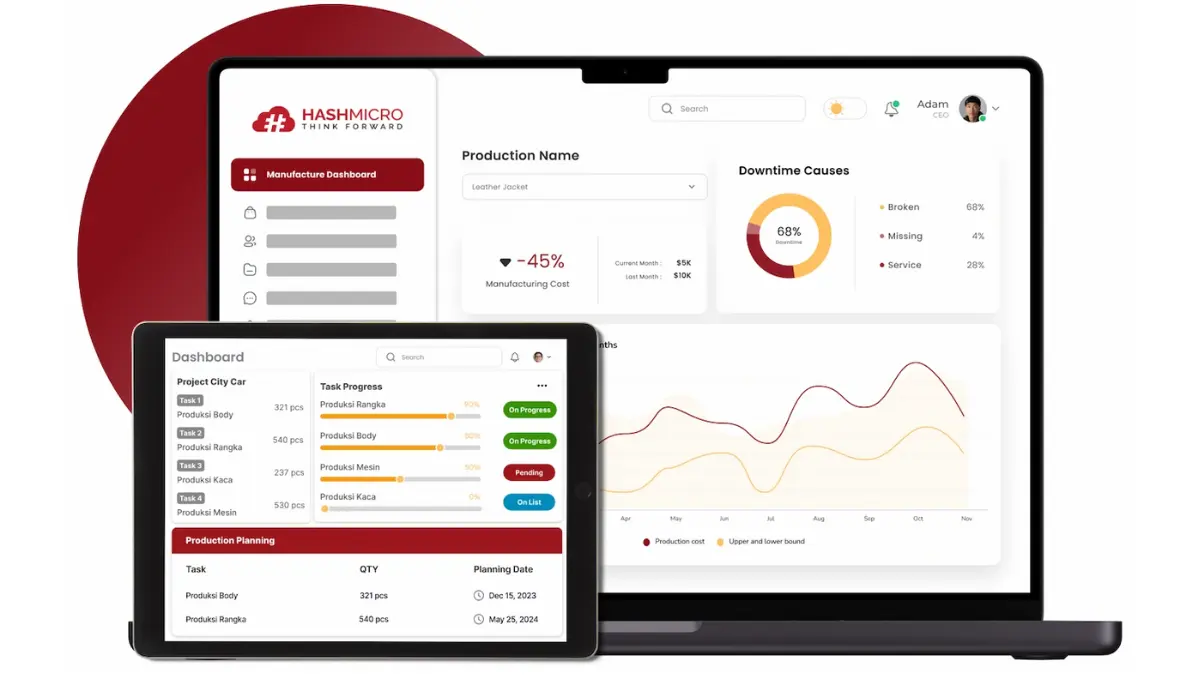Picture running a manufacturing plant where every process is automated, intelligent, and constantly adapting to changes in demand. This is the promise of smart manufacturing. In today’s digital age, managers must choose: evolve with the times or risk falling behind.
However, implementing smart manufacturing often comes with its own set of hurdles. From outdated systems that don’t sync with modern solutions to the complexities of data management and cybersecurity, these issues often prevent businesses from fully realizing the benefits of Industry 4.0.
A 2022 study by Deloitte found that while 75% of Filipino manufacturing executives acknowledge the significance of Industry 4.0, less than 30% feel ready to embrace smart manufacturing solutions.
Despite these challenges, it’s not all doom and gloom. This article will break down what smart manufacturing involves and introduce practical solutions that can help your business thrive. Keep reading to discover how smart manufacturing technology can revolutionize your operations.
Table of Contents

Key Takeaways
|
What is Smart Manufacturing?
Smart manufacturing is an advanced approach that integrates cutting-edge technologies—such as artificial intelligence (AI), Industrial Internet of Things (IIoT), robotics, and cloud platforms—into the manufacturing ecosystem. This integration allows companies to collect, analyze, and act on real-time data to optimize production processes, increase flexibility, and drive better business outcomes.
At the heart of smart manufacturing technology lies the IIoT framework, where machines, devices, and systems are interconnected through sensors and data communication networks. These sensors generate valuable insights into every stage of the production line, enabling predictive maintenance, process optimization, and greater transparency across the supply chain.
By combining data-driven tools like digital twins, AI robotics, and cloud smart manufacturing platforms, businesses can automate tasks, reduce downtime, and respond faster to market demands. While implementation may be complex, adopting smart manufacturing solutions unlocks a new level of operational efficiency, product innovation, and long-term profitability.
History: From Industry 1.0 to Industry 4.0 Manufacturing
The journey of modern manufacturing began with the First Industrial Revolution, which introduced steam power to mechanize production. This breakthrough transformed manual labor into machine-assisted processes, laying the foundation for industrial progress.
The Second Industrial Revolution marked the rise of electricity and mass production. Assembly lines, powered machinery, and improved energy efficiency redefined productivity and scalability in manufacturing.
In the Third Industrial Revolution, automation and computers emerged, enabling factories to streamline their workflows and reduce human error. This era marked the early stages of digitization, laying the groundwork for more intelligent systems.
Now, with Industry 4.0, we’ve entered the era of smart manufacturing, powered by AI, cyber-physical systems, IIoT, and cloud-based innovative manufacturing platforms. Instead of replacing traditional factories, innovative manufacturing technology enhances them with data-driven tools and flexible, adaptive, innovative manufacturing solutions to meet evolving business needs.
Top 5 Benefits of Smart Manufacturing
Adopting smart manufacturing is more than a technological upgrade, it’s a strategic shift that transforms how your entire business operates. By leveraging real-time data, automation, and cloud innovative manufacturing platforms, companies can unlock new levels of efficiency, agility, and long-term value.
Below are the top five business benefits that innovative manufacturing solutions can deliver when implemented effectively:
1. Enhanced efficiency and productivity
Innovative manufacturing technology allows your team to work faster and smarter through automation, real-time analytics, and integrated workflows. IoT-connected machines can detect inefficiencies early and adjust processes automatically to reduce downtime.
Predictive maintenance ensures that equipment stays in peak condition, preventing costly breakdowns. Altogether, this leads to higher output with fewer resources and greater operational stability.
2. Greater agility and responsiveness
With access to real-time data, smart manufacturing solutions enable businesses to respond promptly to market changes or customer demands. Whether it’s shifting production lines or customizing products, manufacturers can pivot with speed and precision.
Advanced sensors and analytics enable the early detection of fluctuations, triggering automatic adjustments throughout the supply chain. This agility improves your ability to stay competitive and deliver timely, tailored results.
3. Improved sustainability
Smart manufacturing isn’t just about performance—it also promotes responsible practices. By utilizing data to track energy consumption and material waste, businesses can develop more sustainable and cost-effective operations.
From eco-friendly product design to greener logistics strategies, innovative manufacturing technology supports long-term environmental goals. This commitment to sustainability enhances brand reputation and appeals to increasingly conscious consumers.
4. Superior quality control
With innovative manufacturing solutions, quality assurance becomes proactive rather than reactive. Integrated systems enable businesses to monitor production quality at every stage, thereby reducing the likelihood of defects or recalls.
Real-time visibility helps enforce compliance and traceability standards, ensuring that products consistently meet expectations. The result is fewer customer complaints, better reviews, and a more potent competitive edge.
5. End-to-end cost savings
Cloud-based innovative manufacturing platforms enhance everything from inventory forecasting to supply chain coordination, resulting in significant cost savings. Better demand prediction and production planning help eliminate excess inventory and unnecessary costs.
Automated insights also reduce human error, optimize labor allocation, and streamline logistics. Ultimately, smarter operations result in more value being delivered to both the business and its customers.
Smart Manufacturing Technologies
Smart manufacturing thrives on a foundation of interconnected technologies that work seamlessly to automate, analyze, and optimize every aspect of production. Each component plays a critical role in building a smarter, more resilient factory.
Below are the core smart manufacturing technologies driving innovation and operational excellence:
1. Industrial Internet of Things (IIoT)
IIoT serves as the core framework of smart manufacturing, connecting machines and devices to send and receive real-time digital data continuously. This connectivity creates a network where systems can automatically adjust processes, identify inefficiencies, and enhance overall performance.
By integrating IIoT into all manufacturing assets, businesses gain complete visibility and control over their operations. This results in smarter, data-driven decisions, enabling companies to optimize workflows, respond quickly to changes, and improve efficiency and agility.
2. Artificial Intelligence (AI) and Machine Learning
AI transforms raw manufacturing data into actionable insights by analyzing patterns, predicting outcomes, and driving automation. Combined with machine learning, smart systems continuously improve themselves, learning from historical trends and real-time feedback.
These technologies enhance forecasting accuracy, quality control, and operational efficiency across the production line. AI is a critical part of any scalable smart manufacturing solution.
3. Big data
Big Data fuels the intelligence behind smart manufacturing technology by providing vast, complex, and varied data sets for analysis. When processed through AI, this data reveals hidden insights about production efficiency, supply chain performance, and customer demand.
The ability to capture and analyze Big Data gives manufacturers a strategic edge in decision-making and long-term planning. It ensures that every improvement is backed by evidence, not assumptions.
4. Autonomous robots
Unlike traditional robots that follow static programming, autonomous robots in smart factories can make real-time decisions using embedded sensors and cloud connectivity. These machines adapt to changes in the production process, improving speed, safety, and consistency.
As part of smart manufacturing solutions, they reduce human error and support high-volume, high-precision output. Their flexibility enables businesses to scale quickly without compromising quality.
5. Additive and hybrid manufacturing (3D Printing)
Additive manufacturing, often referred to as 3D printing, enables the on-demand creation of complex parts using digital designs. It reduces the need for large physical inventories by allowing companies to maintain a “virtual inventory” and produce components as needed.
This approach is especially beneficial for industries with diverse and unpredictable parts requirements, such as aerospace. As a smart manufacturing technology, it increases supply chain resilience and minimizes waste.
6. Cloud computing
Cloud smart manufacturing allows businesses to store, access, and process vast amounts of operational data from anywhere. With wireless access via Wi-Fi or 5G, teams can manage systems, monitor machines, and execute tasks remotely and in real time.
Cloud platforms also facilitate collaboration between departments, locations, and even partners across borders. This level of scalability and flexibility is essential for modern manufacturers navigating global markets.
7. 5G connectivity
5G is a game-changer in enabling real-time communication across smart manufacturing ecosystems. Its ultra-fast speeds, low latency, and high capacity ensure seamless data transmission between devices, sensors, and cloud platforms.
Manufacturers can deploy more connected assets without performance slowdowns. With 5G, businesses can fully unlock the potential of smart manufacturing solutions and scale faster than ever before.
8. Edge computing
Edge computing brings AI and analytics closer to the source of data—right on the factory floor. Instead of waiting for data to be sent to the cloud and back, decisions can be made instantly at the edge, reducing delays.
This is crucial in time-sensitive environments where even a few seconds of lag can disrupt production. It empowers smart manufacturing systems to be faster, more responsive, and highly autonomous.
9. Simulation and digital twins
Digital twins are virtual replicas of real-world assets, processes, or systems, created using live data from sensors and software. Manufacturers use these simulations to test improvements, optimize processes, and identify potential failures before they occur.
This reduces the risk and cost associated with physical prototyping and allows for continuous process refinement. It’s a powerful tool in cloud smart manufacturing strategies for improving innovation and product development.
10. Design for Manufacturing (DFM)
Design for Manufacturing is a data-driven approach that ensures product designs are both customer-centric and production-friendly. Using insights gathered from across the production line, designers can make informed decisions that reduce waste and simplify assembly.
This cross-functional practice leads to products that are easier to manufacture and customize without sacrificing quality. In smart manufacturing, DFM bridges the gap between R&D and the shop floor for more agile innovation.
Automated Manufacturing vs. Autonomous Manufacturing
Automated manufacturing refers to the use of programmed machines or robots to perform repetitive tasks with speed and precision. These machines are essential in high-volume environments, working alongside human operators to increase efficiency and reduce manual labor.
Autonomous manufacturing takes automation a step further by embedding intelligence into the process. Powered by smart manufacturing technology such as AI, machine learning, and IoT, autonomous systems can analyze data, make decisions, and adjust workflows in real time, without human intervention.
This shift from automated to autonomous represents the future of smart manufacturing solutions. By integrating cloud-based smart manufacturing platforms and real-time analytics, businesses—including those engaged in toll manufacturing—gain the ability to adapt instantly to demand changes, optimize production performance, and unlock a new level of operational independence and scalability.
How HashMicro Empowers Your Business Through Smart Manufacturing Technology
Is managing your production workflow and quality control becoming an overwhelming task? Many businesses struggle with inefficient processes and disconnected systems, leading to errors, delays, and frustrated teams.
Imagine a manufacturing environment where processes are interconnected and optimized in real-time. That’s where HashMicro’s Manufacturing Software comes in. It transforms how your business operates by automating and streamlining every part of your production, from planning and material management to quality control.
By centralizing your operations and aligning them with Industry 4.0 standards, you can eliminate manual errors, avoid bottlenecks, and ensure timely order fulfillment, all while gaining full visibility into your production at any given moment.
Here are the key features of HashMicro Smart Manufacturing Software that enable intelligent, seamless production management:
- Manufacturing Production Scheduling with Forecasting: By using demand history to forecast production and visualize it through an intuitive MPS graph, you can plan more accurately and avoid overproduction. This leads to reduced waste, optimized resource allocation, and greater production efficiency.
- IoT Integration for Conveyor Belt Sensors: Integrating IoT sensors into conveyor belts enables real-time tracking of material movement and machine conditions. As a result, your operations become more automated, responsive, and resilient to disruptions.
- OEE (Overall Equipment Effectiveness) Tracking: By continuously monitoring availability, performance, and quality, the system helps you identify inefficiencies in your equipment usage. This ensures maximized machine productivity and reduced unplanned downtime.
- Multi-level BoM & Cost Management: Managing detailed Bills of Materials and tracking material, labor, and overhead costs allows for precise production budgeting. This leads to more accurate pricing, better cost control, and improved profit margins.
- Work Order & Production Order Tracking: Real-time tracking of production and work orders gives you clear visibility into progress and bottlenecks. With this insight, you can improve lead times, reduce delays, and keep projects on schedule.
- Quality Control at Every Production Stage: Implementing quality checks at each stage of production ensures that issues are caught early before reaching the customer. This results in higher product consistency, fewer returns, and enhanced customer satisfaction.
- Gantt Chart-Based Production Scheduling: Using Gantt charts to visualize production timelines enables better coordination of resources, tasks, and timelines. This improves cross-team collaboration and ensures on-time delivery of orders.
- Smart Requisition & Material Planning: Automatically triggering material requisitions based on production plans ensures you always have the right stock at the right time. This prevents stockouts or overstocking, boosting both efficiency and cash flow.
With HashMicro, you’re not just upgrading your system; you’re empowering your business to achieve higher efficiency, precision, and growth. Our software turns your manufacturing process into a competitive advantage. Say goodbye to inefficiency and hello to smarter, more agile production, ready to scale and deliver with confidence.
Conclusion
Smart manufacturing represents a significant shift towards more efficient, data-driven production processes that enhance business agility and profitability. By integrating advanced technologies like IoT, AI, and automation, businesses can streamline operations and better meet evolving market demands.
While transitioning to smart manufacturing can come with challenges such as system integration and data management, HashMicro’s manufacturing software provides a seamless solution to tackle these issues. Our customizable ERP system simplifies the entire process, helping businesses automate production, gain real-time insights, and enhance operational efficiency without the complexity.
Take the first step towards optimizing your processes, sign up for a free demo today, and see firsthand how our comprehensive software can revolutionize your manufacturing operations.
























